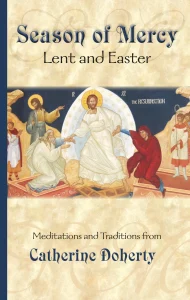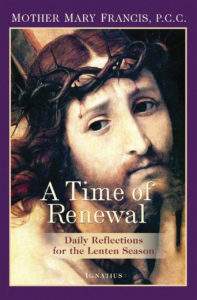Podcast: Play in new window | Download (Duration: 7:06 — 5.0MB) | Embed
Subscribe: Apple Podcasts | Spotify | Amazon Music | Android | Pandora | iHeartRadio | JioSaavn | Podchaser | Gaana | Podcast Index | Email | TuneIn | Deezer | Anghami | RSS | More
Part 3 – Chapter 15 of the Introduction to the Devout Life by St. Francis de Sales
This is a Discerning Hearts recording read by Correy Webb
PART 3 – CHAPTER XV. How to exercise real Poverty, although actually Rich
THE painter Parrhasius drew an ingenious and imaginative representation of the Athenians, ascribing sundry opposite qualities to them, calling them at once capricious, irascible, unjust, inconstant, courteous, merciful, compassionate, haughty, vain-glorious, humble, boastful, and cowardly;—and for my part, dear daughter, I would fain see united in your heart both riches and poverty, a great care and a great contempt for temporal things. Do you take much greater pains than is the wont of worldly men to make your riches useful and fruitful? Are not the gardeners of a prince more diligent in cultivating and beautifying the royal gardens than if they were their own? Wherefore? Surely because these gardens are the king’s, to whom his gardeners would fain render an acceptable service. My child, our possessions are not ours,—God has given them to us to cultivate, that we may make them fruitful and profitable in His Service, and so doing we shall please Him. And this we must do more earnestly than worldly men, for they look carefully after their property out of self-love, and we must work for the love of God.
Now self-love is a restless, anxious, over-eager love, and so the work done on its behalf is troubled, vexatious, and unsatisfactory;—whereas the love of God is calm, peaceful, and tranquil, and so the work done for its sake, even in worldly things, is gentle, trustful, and quiet. Let us take such a quiet care to preserve, and even when practicable to increase, our temporal goods, according to the duties of our position,—this is acceptable to God for His Love’s Sake. But beware that you be not deceived by self-love, for sometimes it counterfeits the Love of God so cleverly that you may mistake one for the other.
To avoid this, and to prevent a due care for your temporal interests from degenerating into avarice, it is needful often to practise real poverty amid the riches with which God has endowed you. To this end always dispose of a part of your means by giving them heartily to the poor; you impoverish yourself by whatever you give away. It is true that God will restore it to you, not only in the next world, but in this, for nothing brings so much temporal prosperity as free almsgiving, but meanwhile, you are sensibly poorer for what you give. Truly that is a holy and rich poverty which results from almsgiving. Love the poor and poverty,—this love will make you truly poor, since, as Holy Scripture says, we become like that we love. Love makes lovers equal. “Who is weak and I am not weak?” says St. Paul? He might have said, Who is poor and I am not poor? for it was love which made him like those he loved; and so, if you love the poor, you will indeed share their poverty, and be poor like them.
And if you love the poor, seek them out, take pleasure in bringing them to your home, and in going to theirs, talk freely with them, and be ready to meet them, whether in Church or elsewhere. Let your tongue be poor with them in converse, but let your hands be rich to distribute out of your abundance. Are you prepared to go yet further, my child? not to stop at being poor like the poor, but even poorer still? The servant is not so great as his lord; do you be the servant of the poor, tend their sickbed with your own hands, be their cook, their needlewoman. O my daughter, such servitude is more glorious than royalty! How touchingly S. Louis, one of the greatest of kings, fulfilled this duty; serving the poor in their own houses, and daily causing three to eat at his own table, often himself eating the remains of their food in his loving humility. In his frequent visits to the hospitals he would select those afflicted with the most loathsome diseases, ulcers, cancer, and the like; and these he would tend, kneeling down and bare-headed, beholding the Saviour of the world in them, and cherishing them with all the tenderness of a mother’s love. Saint Elizabeth of Hungary used to mix freely with the poor, and liked to dress in their homely garments amid her gay ladies. Surely these royal personages were poor amid their riches and rich in poverty.
Blessed are the poor in spirit, for theirs is the Kingdom of Heaven. In the Day of Judgment the King of prince and peasant will say to them, “I was an hungred, and ye gave Me meat, I was naked, and ye clothed Me; come, inherit the Kingdom prepared for you from the foundation of the world.”
Everybody finds themselves sometimes deficient in what they need, and put to inconvenience. A guest whom we would fain receive honorably arrives, and we cannot entertain him as we would; we want our costly apparel in one place, and it all happens to be somewhere else: all the wine in our cellar suddenly turns sour: we find ourselves accidentally in some country place where everything is wanting, room, bed, food, attendance: in short, the richest people may easily be without something they want, and that is practically to suffer poverty. Accept such occurrences cheerfully, rejoice in them, bear them willingly. Again, if you are impoverished much or little by unforeseen events, such as storm, flood, fire, drought, theft, or lawsuit; then is the real time to practice poverty, accepting the loss quietly, and adapting yourself patiently to your altered circumstances. Esau and Jacob both came to their father with hairy hands, but the hair on Jacob’s hands did not grow from his skin, and could be torn off without pain; while that on Esau’s hands being the natural growth of his skin, he would have cried out and resisted if any one had torn it off.
So if our possessions are very close to our heart, and storm or thief tear them away, we shall break forth in impatient murmurs and lamentations. But if we only cleave to them with that solicitude which God wills us to have, and not with our whole heart, we shall see them rent away without losing our sense of calmness. This is just the difference between the clothing of men and beasts; the beast’s clothing grows on its flesh, and man’s is only laid on so that it may be laid aside at will.
For other chapters of the Introduction to the Devout Life audiobook visit here –




 “The Feast of Feasts”
“The Feast of Feasts”


